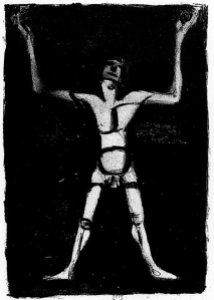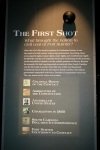
Photo by Filhi bahthi photography via Creative Commons
I’m sitting in a coffee shop, reading, thinking…sitting. Music is n the background. “Celebrate Good Times” begins to play. And suddenly the celebration breaks into my world, my reading, thinking, sitting. My head starts nodding. Soon my shoulders join in. The sounds that were outside me seem to be reverberating from inside me, and my body is moving to the rhythm. Looking around I notice other people responding, moving, smiling. We exchange glances. In a room of strangers, the rhythm visibly connects us for few brief moments.
I’ve had experiences like this in stores, parks, churches and living rooms. The rhythm breaks in upon us and suddenly the room, the people are connected and moving to an unseen current. Music fascinates me, moves me, breaks in upon me. It comes from outside me through a speaker, a guitar, a drum, a singer. But soon it is inside me at the same time. My body, my mind, my emotions all respond, all echo back the rhythm. Somehow I’m connected, caught up in the rhythm.
And oddly, it lingers inside long after the music has stopped playing. The sounds, the words, the feel continues to resound within me. Though I speak about myself, I believe I’m describing an experience that is real for most of us. One moment we’re sitting alone and the next moment we’re caught up in an ocean of sounds that moves us, fills us, connects us.
Not all songs move us in the same ways. Hearing different songs can stir different feelings and different thoughts. For some strange reason, I used to force myself to listen to all sorts of music as some kind of imagined training. In college, I’d sit in the music lounge for hours soaking in all sorts of sounds. I’d join Columbia House Music Club again and again and again. I also joined the “Classical Heritage Society” and the “Jazz Heritage Society.” I’d listen to music I loved and oddly enough music I hated.
I remember picking up John Coltrane’s “Sun Ship” as yet another attempt at my musical education. I never figured it out. There were a few shining moments, but most of the time, I was immersed in chaos. I couldn’t hear one dominant rhythm. Instead, I felt caught up in a swirl of chaos. The music was disorienting.
It made me think of being caught up in the currents of a raucous ocean. Once my dad and I decided to “catch some big waves” by swimming at Myrtle Beach in the middle of an electrical storm. My mom was screaming and pacing up and down the shore while my dad and I were laughing and waving. It was fun but also disorienting. The currents above and below the surface pulled, pushed and turned us all around. When we finally decided to get out of the water, we had a hard time. The undercurrent resisted our every step.
I can only imagine the stress, confusion and disorientation of being caught in a storm at sea. With no land in sight, with no instruments of orientation, it’s easy to see how one could be truly lost of sea. I understand that pilots can experience a similar disorientation in the air. Without reference to his instruments, a pilot may literally not know which way is up. It is now believed that John F. Kennedy Jr.’s lethal crash into the sea in 1999 was a result of spatial disorientation. He thought he was flying up and flew straight into the water.
The currents of air and water and sound waves can propel us forward but also disorient us. We could be going forward; we could be going backward. We may lose our sense of direction.
We are immersed in a world of currents and rhythms. From the beating of our own heart to the fury of storm winds to the pounding of rain, we live in all kinds of rhythms and forces that impact us both inwardly and outwardly. There are also rhythms or currents of ideas, emotions, memories, and symbols that move through culture. The force of these rhythms are just as powerful as the physical force of ocean currents that move above and below the surface.
We cannot step outside of the rhythms of our world. We are all born at a time and place. We are born immersed in families and towns and eras with specific rhythms and struggles and currents. If I am born into a world where slavery is the norm, it will be very difficult for me to resist or act or think outside this force. If I am born into a land at war, I may have no memory of peace and find it difficult to even understand peace. If I am born into a family where divorce is the norm, I may repeat the pattern in my own life or never even marry.
Like the watery chaos of Psalm 46, all of us know the chaos of a world of conflicting ideas and emotions, of undercurrents that impact our dreams and our actions. The music of Scripture breaks into this world of competing currents with a strange alien rhythm. Sometimes when people first read the Bible, it might seem a bit disorienting. It should be. In fact, if it’s never disorienting we may not be paying close enough attention. The Word of the Lord breaks into our world as a challenge to the false rhythms of idolatry and oppression that reverberate on our planet.
In ancient Egypt, we discover the Hebrews trapped in a world of enslavement, oppression, and manipulation. The Word of the Lord breaks into this world as an alien rhythm, challenging the power structures and the whole conception of reality. After leading these nameless, powerless slaves into freedom, the LORD calls these people, His people and He gives them His rhythms that are rooted in love to God and love to man.
In Psalm 1, we hear a song inviting us to meditate or groan aloud these rhythms of love and worship and respect and honor. These rhythms directly challenge the constant rhythms in the counsel of the wicked, the way of sinners, the seat of scoffers. The world of the wicked, sinners and scoffers is built in resistance to the love of God and is rooted in self-preservation. It always leads to oppression and devastation. As the Psalmist sings, he reminds us that currents of the wicked produce a crop of chaff, of nothingness.
Like the disappearing world in “The Neverending Story,” the Psalmist realizes the end result of wickedness. Not some kind of naughty pleasure, but rather to destruction of all relationships, of all meaning, of all hope, of all beauty. The end result is absurd nothingness that blows away in the wind. There is only one sound powerful enough to withstand the gale force of oppression and emptiness: it is Torah, the Law of the Lord. The Psalmist proclaims that those who dwell, live, abide in this Law of Love will bear fruit in all seasons.
Yet even as I’m caught up the wondrous promise of the Psalmist, I am aware of my own duplicity. There are times when I speak words of love and life and encouragement. There are times when the rhythms of love seem to resonate in my every fibre. And yet, I know the fruit of selfishness. I hear James speaking directly to me when he cries out, “From the same mouth come blessing and cursing.” I am not the man who lives in Torah day and night. I am the man who aspires to live in Torah but knows the way of hatred and anger and mockery all too well.
Isaiah says that the Lord looks for one true man, but found no one.
The Lord saw it, and it displeased him that there was no justice. He saw that there
was no man, and wondered that there was no one to intercede;
then his own arm brought him salvation,
and his righteousness upheld him. (Is 59:15-16)
He enters into our watery grave of idolatry. He entered into the alien rhythms of all world in complete resistance to love, a world that cannot build without breaking, cannot speak without cursing, cannot embrace with killing. Jesus, the Son of God, comes as the one true man. He steps into this world of complete disorientation where no one knows how to step forward and everyone stumbles in the dark. He comes as the true light. In His light, in His path, in His words, we behold the true and genuine rhythms of love. He is the God-Man from Psalms 1 who dwells and lives and acts in Holy Love. He enfleshes Torah, he embodies truth, He reveals the Father. He reveals Love between the Son and the Father. In His Life, His Death and His Resurrection He sets in motion reverberations of life that continue resounding and will eventually stop every false rhythm–even death.
So we turn to Him. We behold Him. We cry out to Him, “Lord have mercy.” It is then that we realize, He has embraced us and His song is beating in our heart. Yes, we are still learning His song, but we are no longer adrift in a sea of chaos. The music of the heavens is pulsing through us. Ours heads, our hands and our feet are beginning to dance.
Jeremy Begbie suggests that music itself is not hope but it is a dynamic of hope because it is sweeping us forward. In Christ, we are caught up in a true dynamic of hope. We are joined together in a song of love the will not fail but will overcome every false rhythm and conquer every lying word.
 I’m planning retreat exploring art and faith on May 11-13. This is the first in a series of retreats exploring the relationship between art and faith. This particular retreat explores on art and music that focuses on people at the margins of society. We’ll talk about ways of considering art; we’ll spend time individually meditating on specific songs, paintings or other works; and we’ll also discuss these works in relation to our faith and ask questions about a “spirituality of the arts.”
I’m planning retreat exploring art and faith on May 11-13. This is the first in a series of retreats exploring the relationship between art and faith. This particular retreat explores on art and music that focuses on people at the margins of society. We’ll talk about ways of considering art; we’ll spend time individually meditating on specific songs, paintings or other works; and we’ll also discuss these works in relation to our faith and ask questions about a “spirituality of the arts.” Watching and waiting for his coming.
Watching and waiting for his coming.








